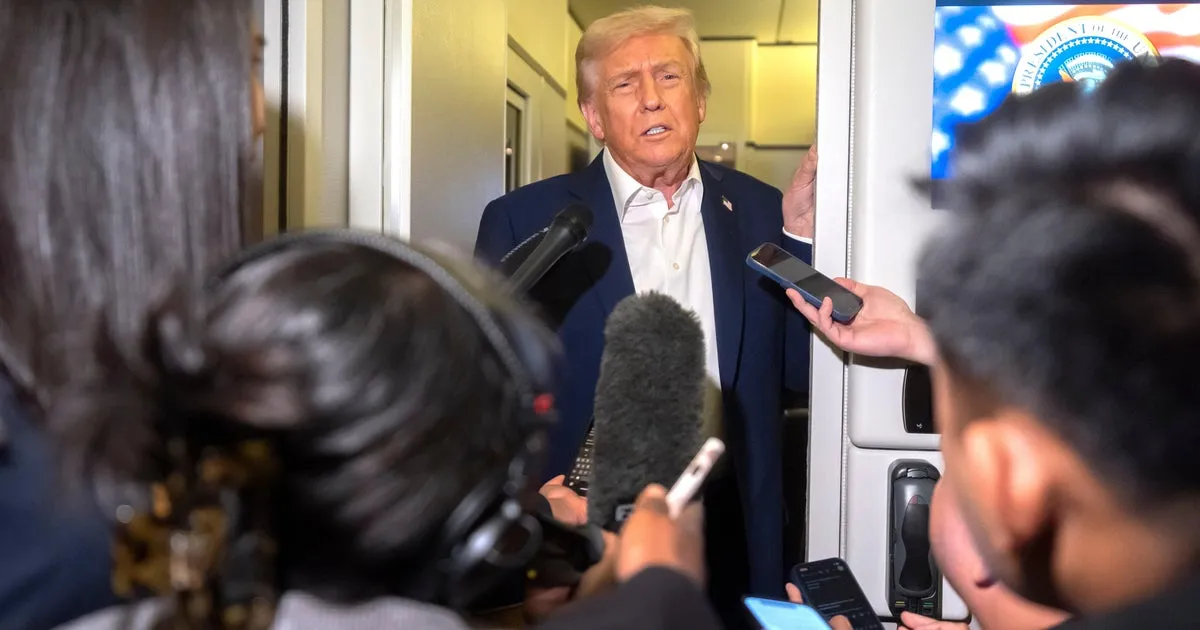
President Donald Trump embarked on his inaugural trip to Asia during his current term, with significant discussions anticipated regarding investment deals and peace initiatives. One of the trip's highlights will be a face-to-face meeting with Chinese President Xi Jinping, where they will aim to de-escalate the ongoing trade war between the United States and China. As he left the White House, Mr. Trump expressed optimism, stating, "We have a lot to talk about with President Xi, and he has a lot to talk about with us. I think we'll have a good meeting."
While aboard Air Force One on Saturday, President Trump indicated that discussions may also center around China's purchases of Russian oil. He noted that China is significantly reducing its future acquisitions following U.S. sanctions imposed on Moscow's two largest oil companies. Reports suggest that Chinese national oil companies will temporarily refrain from buying Russian oil, a shift that highlights the complexities of international relations.
When questioned about his goals for the meeting with China, President Trump stated, "I think a complete deal. I want our farmers to be taken care of, and he wants things also. We're going to be talking about fentanyl." The president expressed confidence in the potential for a comprehensive agreement, indicating a focus on both economic and health-related matters.
President Trump's long-haul flight will first take him to Malaysia on Sunday morning as part of a three-country visit. During a refueling stop in Qatar, he met with the emir and prime minister, who expressed eagerness to discuss matters with the U.S. leader. Mr. Trump praised Qatar's leadership for their role in the Israel-Hamas peace deal, calling them "a great ally."
This trip occurs amid the ongoing U.S. government shutdown, which has left many federal workers facing missed paychecks. While the government remains in turmoil, some critics, like Senate Democratic leader Chuck Schumer, have pointed out that President Trump appears to be maintaining a 'business as usual' approach.
Trump's first official engagement will be at a regional summit in Kuala Lumpur. Although he attended the Association of Southeast Asian Nations (ASEAN) summit only once during his first term, this year’s summit is particularly relevant as Malaysia and the U.S. collaborate to address tensions between Thailand and Cambodia. Mr. Trump is scheduled to meet with Malaysian Prime Minister Anwar Ibrahim and participate in a joint signing ceremony with the prime ministers of Thailand and Cambodia.
On his social media, Trump highlighted the significance of the upcoming Peace Deal, which he claims to have brokered between Thailand and Cambodia. He also extended his condolences to the Thai people following the passing of Queen Mother Sirikit, emphasizing the importance of maintaining strong diplomatic relations.
Following his engagements in Malaysia, President Trump will travel to Japan and South Korea. In Japan, he aims to negotiate approximately $900 billion in investments for U.S. factories and projects, which are contingent on reducing Trump's proposed tariff rates from 25% to 15%. This visit comes on the heels of Japan's election of its first female prime minister, Sanae Takaichi, who is expected to foster a continuation of the strong ties established by former Prime Minister Shinzo Abe.
Trump's itinerary includes a meeting with Japanese Emperor Naruhito and interactions with U.S. troops stationed in Japan, showcasing the multifaceted nature of his diplomatic mission.
In South Korea, the president is anticipated to hold a crucial meeting with President Xi on the sidelines of the upcoming Asia Pacific Economic Cooperation (APEC) summit. Although the APEC summit will occur in Gyeongju, the Trump-Xi meeting is reportedly set to take place in Busan, marking a pivotal moment in U.S.-China relations.
As President Trump engages with multiple nations during this trip, the outcomes of these discussions could significantly impact international relations and trade dynamics in the Asia-Pacific region.